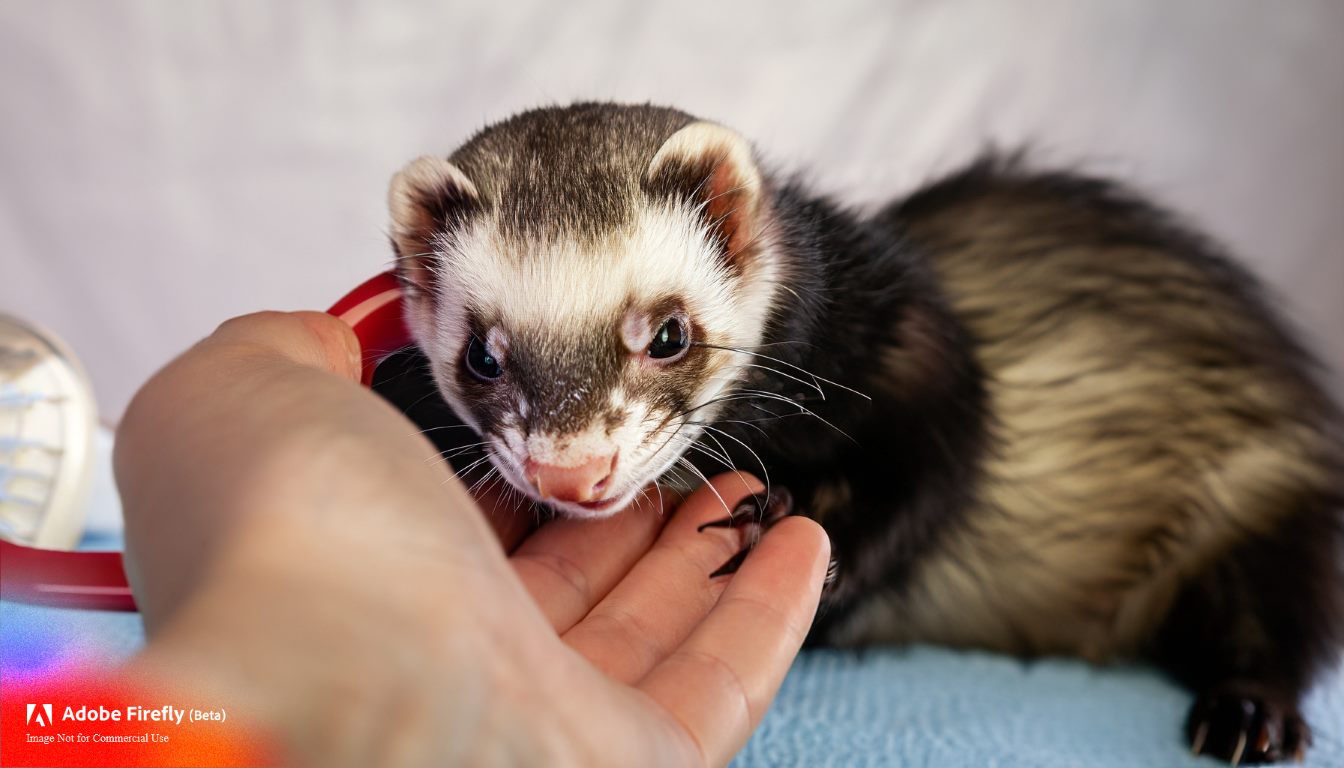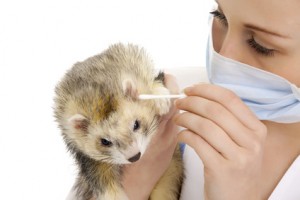
When you brought home your ferret, whether purchased or adopted, you made a significant commitment – and a big investment. Naturally you want to be sure you keep your ferret healthy and happy for years to come. There are 10 simple rules to follow.
- Make an appointment with a vet who’s familiar with ferrets. The vet will examine your ferret to make sure it’s in good baseline health, so he or she will likely examine:
- feces to rule out parasites
- the teeth and mouth for gum disease, tooth grinding and tooth looseness
- the skin for tumors
- the ears for mites
- the ferret’s legs for strength and its mental acuity for signs of insulinoma (a pancreatic cancer unfortunately common in ferrets).

The vet will also administer the two essential vaccines: one for canine distemper (usually at 8, 11 and 14 weeks, then annually); and the other for rabies, even if you intend to keep yours indoors. (If your ferret nips or bites someone, if it has not been vaccinated, it could be seized and killed in order to be tested for rabies. With a current vaccine, your ferret would likely only need to be quarantined for a time.)
Your vet will also provide a heartworm preventive, either on the skin or via an injection. Heartworm is spread through mosquito bites and can be fatal in ferrets. The vet will also suggest a flea preventive for you to administer at home.
Lastly, your vet will talk to you about ways to prevent adrenal gland disease, another common ferret ailment. He or she may suggest a GnRH vaccine or even an implant that is good for one year.
Keeping current on your ferret’s check-ups and immunizations is the single most important thing you can do to keep your pet safe and healthy.

- Feed your ferret the right foods, high in protein and low on carbohydrates. Most ferrets do quite well on prepackaged foods designed especially for them. (In a pinch, you can use a very high-quality cat food, but ferret food is best.) Avoid giving your ferret carbohydrates, especially sugary snacks. Not only will they rot the teeth and make your ferret gain weight, eating a lot of carbohydrates can cause your ferret to develop insulinoma and other health problems.
- Let your ferret out of the cage every day for at least two hours. Ferrets hate being cooped up and physically need time to run around and exercise. They need time with you too, so make sure free time is “quality time”.
- Clean your ferret’s cage regularly: Clean the litter box daily (including removing debris and changing the litter). Clean the beddings, hammocks and similar cage items every week. Use an enzyme-based deodorizer as needed to get rid of odors. (If odors are a problem, consider using an air freshener that plugs into an electric outlet. Just be sure it is located where your ferret can’t chew it.)
- Brush your ferret’s teeth at least every week and more often if you do feed it sugary snacks. Use a toothpaste designed for pets, not humans.
- Trim your ferret’s nails if they don’t wear down by themselves. Your vet will show you how to do it with equipment made especially for small pets. Never use human nail clippers – it is far too easy to injure your ferret with them.
- Take the time to train your ferret to use the litter box, to walk on a leash, to come when called. These skills will help you and your ferret to be happier and healthier.
- Brush your ferret’s fur regularly. This has several advantages:
- It helps establish a bond between you both.
- It helps get out tangles and debris.
- It allows you a chance to thoroughly examine your ferret for any unusual conditions (lumps, fleas, hair loss etc.)
- It helps calm your ferret if it is stressed.
- Bathe your ferret. New ferret owners may be surprised to see this so far down the list. Actually your ferret shouldn’t bathe more than every two months or else it will lose its natural oils and actually become smellier. You can use a flea shampoo safe for kittens or one that is specially made for ferrets. Just be sure to rinse your ferret thoroughly and dry it thoroughly.
- Pay attention to your ferret. Watch out for its physical and emotional health. Check its feces, skin, ears, fur and teeth regularly. Don’t hesitate to contact your veterinarian with any questions you may have. He or she may be able to point you to other resources, such as local ferret organizations and suppliers.
Any member of the family needs to be taken care of. Your ferret is no different. Follow these easy steps and you will be well on your way to being a ferret-care expert.






